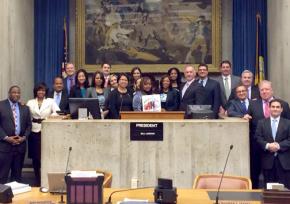Domestic workers need rights
Legislation under consideration in Massachusetts that would extend workplace rights to domestic workers is desperately needed, writes .
ON FEBRUARY 26, the Boston City Council passed a unanimous resolution in support of the Massachusetts Domestic Workers' Bill of Rights (H. 3884), which is currently being considered by the House Ways and Means Committee.
If passed, the bill would amend Massachusetts state labor laws to extend basic workplace protections to domestic workers, the majority of whom are low-paid immigrant workers, under informal contracts, who do not have the means to negotiate with their employers under abusive or dangerous work conditions.
Cosponsored by state Rep. Michael Moran (D) and Sen. Anthony Petruccelli (D), and endorsed by 83 other legislators, this bill would give Massachusetts domestic workers the right to a signed contract from employers, formally outlining their duties, pay, time off and other work arrangements.
Only 8 percent of the 67,000 domestic workers in the state of Massachusetts currently have written contracts with their employers. The vast majority work informally under verbal agreements.

As a result, domestic workers are particularly vulnerable to abuse and exploitation. About one-fifth of housekeepers, and one-third of nannies and caregivers make less than the minimum wage. Fifty percent of workers who live with their employers say that they are not allowed to have any breaks, and 25 percent say that they can't even have uninterrupted sleep. About 20 percent have experienced verbal abuse and threats by their employers, but there is no formal way to report or file for these abuses under state labor laws.
The Domestic Workers' Bill of Rights would give housekeepers, nannies and caregivers the right to file complaints of abuse or harassment; protection from camera surveillance in their private living spaces; and protection from illegal charges for food or lodging, or threats of eviction without notice. It would also give these workers 24 hours off per seven-day calendar week, the right to meal and rest breaks, parental leave, sick time and notification of termination or severance pay.
Councilor-at-large Michelle Wu filed the resolution in the Boston City Council, stating, "This legislation would extend basic workplace protections to domestic workers, including clarity on what constitutes working time; freedom from discrimination, sexual harassment, and the abuses of trafficking; and from retaliation for asserting wage violations."
The Massachusetts Coalition for Domestic Workers, a group of five immigrant and women's organizations, is spearheading the legislative campaign, in a national and international movement towards recognizing the working rights of care laborers. New York was the first state to pass the Domestic Workers' Bill of Rights in 2010, joined in 2013 in May by Hawaii, and in September by California. The bill did not pass the Oregon Senate. There is also preparation for the bill to be considered in Texas and Ohio later this year.
Domestic workers are the backbone of our economy, providing working women and men the support needed to pursue busy careers, and providing care for our nation's children and elders. It is a shame that this care labor is undervalued, and that so many domestic workers experience exploitation and abuse from employers.
The innovative grassroots organizing that domestic workers are doing, in the midst of a harsh climate for immigration reform, is a source of inspiration for many other communities, and is helping to revitalize the American labor movement.


